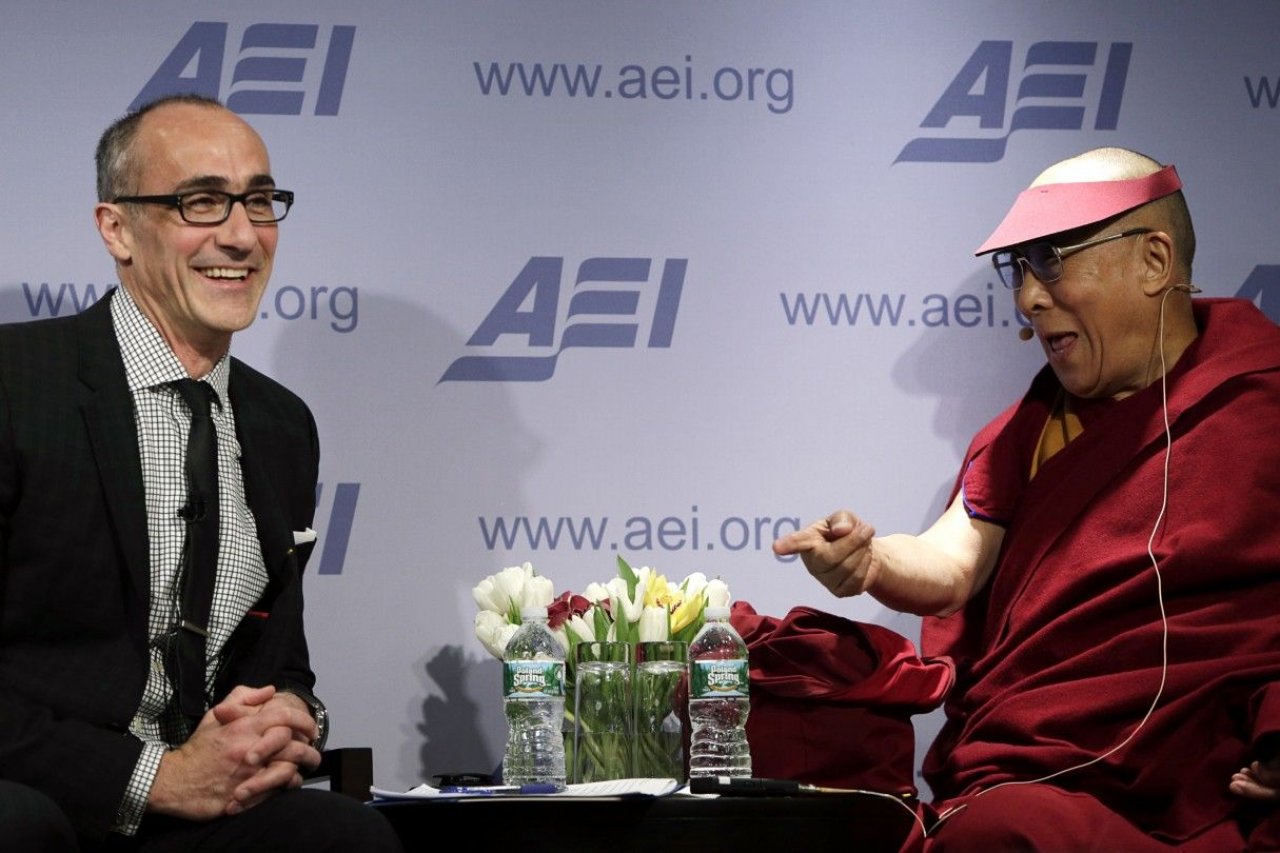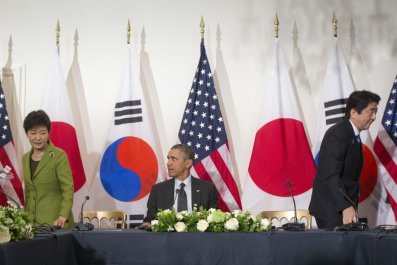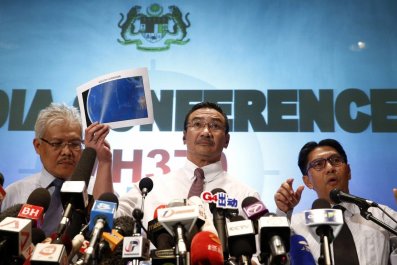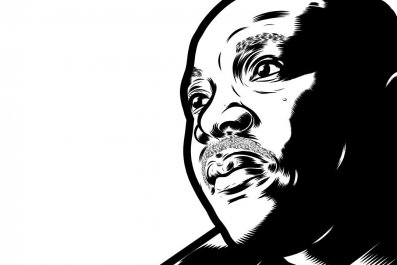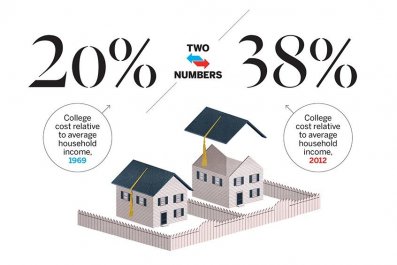On the corner of Massachusetts Avenue and 18th Street in Northwest Washington, D.C., sits the Beaux Art apartment building where Andrew W. Mellon, the uber-rich banker and treasury secretary under three presidents, lived almost a century ago.
"It's the most significant architectural space in the central business district. Beautiful!" Arthur Brooks, president of the conservative American Enterprise Institute (AEI), told me. "We bought it. It's the new AEI."
The building, undergoing two years' worth of renovations to prepare it for its new inhabitants, is an apt metaphor for the transformations going on at AEI. A makeover, both inside and out, with Brooks at the helm.
AEI is on the rise. Its influence is growing on Capitol Hill, where Brooks, a former musician and college professor, is now a sought-after counsel to Republicans like House Budget Committee chairman and presidential hopeful Paul Ryan, R-Wis., and House Majority Leader Eric Cantor, R-Va. Earlier this year, Brooks delivered the keynote address at both House and Senate GOP retreats.
"He's expanding the influence of AEI," said Representative Patrick McHenry, R-N.C. "His network on Capitol Hill has expanded greatly."
An aide to the Republican House leadership concurred. "It is amazing the number of individual members who will say, 'I was talking to Arthur the other day,' " the aide said. "I think members and staff are talking to AEI scholars more, consulting with AEI more today than probably they ever have."
Republicans today are in need of advice. The Tea Party continues to divide their ranks as the GOP establishment tries to scrub the party of its anti-immigrant, anti-poor, anti-woman reputation in time for the next election. And while Republicans are quick to praise AEI's scholars, Brooks himself offers something more than policy.
He's the message man. He may not be a pollster, but Republicans say he possesses a gift for making conservative policies sound appealing. That is a rare talent and one GOP-ers feel they need to end their presidential losing streak.
"I think he's the right man for that institution at this moment in time," said Peter Wehner, a friend of Brooks and an alum of the past three Republican administrations. "He has become a star."
Brooks rattles through the investments AEI has made in the past five years, including hiring over 60 new people. The new headquarters will have TV and radio studios and classrooms, as AEI ramps up its media presence and extends its reach to college campuses, paid for in part by a $20 million donation from billionaire Daniel A. D'Aniello, chairman of the private equity firm the Carlyle Group. "We've grown like crazy," Brooks says, before making the noise of an explosion.
But in the free marketplace of ideas, as in all markets, it always helps when your competitors stumble. It's no coincidence that AEI's newfound popularity comes at a time of waning influence for another D.C. think tank, the Heritage Foundation.
Last April, former senator Jim DeMint of South Carolina, a Tea Party star, became Heritage's president. Along with an active lobbying arm, Heritage Action for America, DeMint's Heritage helped orchestrate the government shutdown last year, fought a farm bill to the chagrin of many rural Republicans, and began issuing scorecards that labeled lawmakers as insufficiently conservative if they voted for bills like the Ryan-Murray budget, in which Ryan compromised with the Democratic Senate Budget Committee Chair Patty Murray.
These tactics have raised Heritage's profile as a leader among ultraconservatives, but their aggressive stance has stung Republican lawmakers. "We went into battle thinking they were on our side, and we find out they're shooting at us," an exasperated Representative Mick Mulvaney, a conservative Republican from South Carolina, said last summer.
In the conservative ecosystem, heavyweight institutions funded by rich donors (AEI has about 1,200) compete. Among them is the Hoover Institution at Stanford University in Palo Alto, Calif., where Republican stars like former Secretary of State Condoleezza Rice are fellows.
There's the Manhattan Institute, a conservative outpost in liberal New York City, the Hudson Institute in D.C., mostly focusing on national security and foreign policy, and the Ethics and Public Policy Center that punches above its weight when it comes to influence. And there is the Cato Foundation, a libertarian think tank, which has blossomed since that philosophy became more in vogue among Republicans.
Enter AEI.
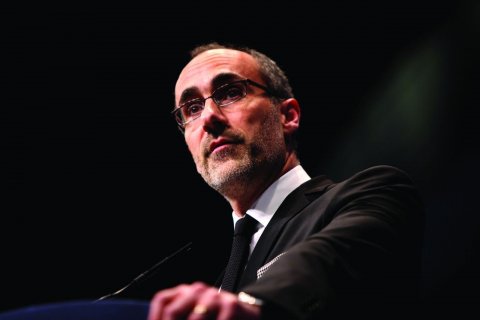
"They're filling a void that was left...when Heritage became a political organization," said Representative Devin Nunes, R-Calif., who has worked with both think tanks. "When Heritage kind of went off on that path, there was just no one else."
"They are a conservative movement icon. Great for them," Brooks said of Heritage, who had nothing but kind words for the frenemy think tank that has long overshadowed AEI. Certainly, Brooks has no reason to complain about the more aggressive path Heritage has recently taken.
Like the Mellon Building, AEI has been a Washington presence for decades—but not necessarily one people noticed. Founded in 1938, by the 1960s AEI had become a traditional, conservative-leaning think tank. But its wonkish focus on policy without aggressive promotion of that work left an opening for a more activist-minded policy shop. Heritage was created to fill that void.
"When Heritage started in the 1970s, they never wanted to be that sort of serious, rigorous policy shop that they saw the American Enterprise Institute as," explained Jason Michael Stahl, a historian at the University of Minnesota. "At the outset they said, 'Look, the problem with AEI is AEI is not activist. In a fast-paced new policy world, they don't try to influence policy. What we want to do is influence policy.' "
And Heritage did just that, producing short policy briefs about current issues and putting them on lawmakers' desks the very next day. By the 1980s and 1990s, it had become a tour de force. Heritage was more fundamentally conservative than AEI and maintained a connection to the grassroots of the conservative movement.
Meanwhile, AEI stumbled. It lost some of its top scholars in the early 1980s, then teetered on the edge of bankruptcy a few years later. It wasn't until the George W. Bush administration, when its strong neoconservative leanings lined up nicely with Bush's foreign policy agenda, that AEI again became prominent. But as Bush's neoconservative policies fell out of favor and a new administration took over, it was evident AEI still had not captured the insider-Beltway status that made Heritage so influential.
It's a history Brooks is trying not to repeat.
"I'm way more into branding than my predecessors," Brooks said.
"The traditional academic model is that you do a lot of work and it will be so good that sometime somebody will find it and it will change some public policy," he said. Instead, Brooks's model is aggressive outreach. AEI has made investments in its communications department and Capitol Hill outreach. The metrics by which you might calculate success—newspaper op-eds, scholars testifying before Congress—have gone up exponentially under Brooks.
Then there's the stuff that's off the books. "We're meeting with senators and congressmen and staff—lots and lots and lots of informal stuff," Brooks said. "That's where the real influence is."
In some ways, Brooks is an unlikely conservative leader. He was raised in a liberal family in Seattle, and dropped out of college to spend his 20s as a professional French hornist, including several years in the Barcelona city orchestra.
Brooks ultimately finished his bachelor's degree through a correspondence school in New Jersey. From there, he got a master's in economics and a Ph.D. in public policy, then taught at Syracuse University. He became AEI's president on January 1, 2009, 20 days before Barack Obama's inauguration.
Through it all, Brooks became a skilled salesman for the conservative movement. His specialty was translating ideas from policy speak into soaring moral prose. In his 2010 book, The Battle: How the Fight Between Free Enterprise and Big Government Will Shape America's Future, Brooks framed a right-vs.-left debate over the role of government as the next culture war, distilling complex subjects into identity politics. Two years later, Brooks published The Road to Freedom: How to Win the Fight for Free Enterprise, arguing that free enterprise is under attack and that only a moral defense—rather than a wonky one—can save it.
"He understands the need to put public policy in moral and ethical terms in ways that touch the heart, not just the mind," said Wehner. Politics needs a narrative, he said, and Brooks "has a lot to offer there."
His skills at passionate storytelling are evident when listening to him talk about his latest campaign: combating poverty. Describing AEI's work for the poor, he used words like "warrior," "cause" and "gospel."
His pitch goes like this: Liberals' approach to poverty is all talk, while conservatives often fail to talk about it at all. "Somebody has got to do better than that, and that somebody is us," he said of AEI. "We're the warriors for the people who really need us."
Poverty was the key issue when he addressed Republican lawmakers this winter at their annual retreats. In February, Brooks welcomed the Dalai Lama to AEI to discuss "moral markets," a collaboration he said took months and a trip to India to arrange. He recently wrote on the subject in the conservative magazine Commentary. New York Times conservative columnist David Brooks described Arthur Brooks's message as "capitalism for the masses."
On Capitol Hill, that message sounds very similar to the one preached by Ryan, who plans to roll out a comprehensive antipoverty agenda this year. Ryan's office works closely with AEI and the two men are friends.
The Commentary essay called for a sweeping conservative social justice agenda based on welfare reform that would preserve the safety net for the very poor, cut it back for others, and increase welfare work requirements. Ryan's major poverty agenda hasn't been released yet, but it's expected to look a lot like Brooks's.
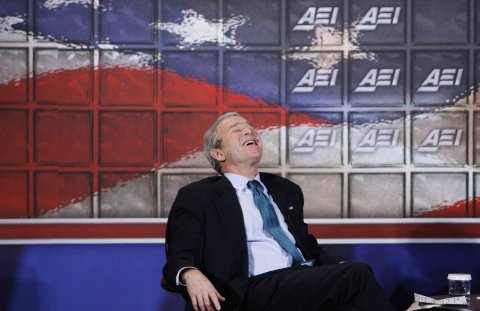
Brooks's call for Republicans to address poverty is about defining the debate—leaving his scholars to refine the policy details. "If you actually don't believe that free enterprise is the most moral system for lifting people up and that enterprise should be enterprise in each person's life, then you're wasting your time," Brooks explained to me. "Then it's just somebody's power, somebody's money. You're competing over details, you're fighting over scraps at that point."
"Arthur translates how conservative ideas lift families out of poverty, offer greater opportunity and a more optimistic and happier future," Cantor, the second-ranking Republican in the House, told Newsweek.
"The concentration on the poor is important...because a society should be judged by how it treats the people who live in the shadows of society," said Wehner, who has been referred to recently as a Republican reformer, one of a group of conservatives who believe the GOP needs to embrace a more proactive policy agenda.
"But I also think it's politically potent because it demonstrates to voters, the electorate, that the Republican Party, the conservative movement, cares about more than small-business owners," he said.
I asked Brooks whether Republicans would attract more votes if they talked more often as he does about the poor. "I have the data that shows that that would win for them," he said. "If you have two candidates in 2016, Republican and Democrat, and they're both perceived to be equally compassionate: game over. It's already won. Republicans win."
He was referring to research by Danny Hayes, a political scientist at George Washington University, who years ago had an office next door to Brooks at Syracuse. But when asked about his research, Hayes said that closing Republicans' perceived compassion gap with Democrats would not necessarily be a game changer.
"Did Romney lose because he was perceived as less empathetic than Obama?" asked Hayes. "I think most political scientists say no, Romney lost because the economy was actually doing well enough to help an incumbent win re-election."
But, to the extent that Republicans can allay the misgivings voters have of them—which include a perceived lack of sympathy for struggling Americans—Hayes said that's a worthy strategy for the GOP to pursue.
Of course, not all conservatives—and certainly not all Democrats—believe Brooks, Ryan or any other Republican will be successful in their rebranding effort unless their policies change.
When Brooks said as much a year ago in a Wall Street Journal op-ed, conservative journalist Josh Barro penned a rebuttal. "The most important policy question on which Republicans and Democrats differ is to what extent the government should support the poor within the context of a free-enterprise system?" Barro wrote. "Democrats' position on that question is better for the poor than Republicans'. That, and not any failure of messaging and understanding, is why Republicans are perceived as not caring about the less fortunate."
In other words, repackaging old conservative policies in shiny new wrapping won't save the GOP. The policies themselves need to change.
The GOP's attempt to take on the poverty issue is easier said than done. Ryan sparked accusations of racism from the left when he spoke in March about poverty as a "culture problem."
"We have got this tailspin of culture, in our inner cities in particular, of men not working and just generations of men not even thinking about working or learning the value and the culture of work, and so there is a real culture problem here that has to be dealt with," Ryan said.
The next day, Ryan said his comments were "inarticulate" and that "I was not implicating the culture of one community—but of society as a whole. We have allowed our society to isolate or quarantine the poor rather than integrate people into our communities."
Some liberal commentators pointed out that even President Obama can sound like Ryan when he addresses the black community, a view that led to a heated debate among liberal bloggers over poverty's causes.
Ryan's comments sounded a lot like Brooks's. In his Commentary article Brooks diagnosed poverty as "often intertwined with social pathologies" and prescribes "transforming the character and values of individuals and communities" as "essential to genuinely helping those in need."
Ryan's and Brooks's message places blame on individuals and communities rather than the social and economic forces that create poverty, including a history of slavery and racism toward black Americans. It's a position that invites liberal opposition and could prove hard to defend.
While the jury is still out on whether Republicans' new focus on poverty will turn into electoral gains, AEI is already benefiting from Brooks's skills as a fund-raiser and promoter. The organization never thrived when it was simply a wonky policy shop. Brooks is providing AEI with something extra.
"I think that think tanks now are just less relevant in terms of even what they are able to do," said Stahl. "I really think we are entering into a period now where policy is fundamentally debated as a marker of identity. Policy has essentially become identity politics."
That is what the Heritage Foundation does, he points out, providing a brand of pure ultraconservatism. And it's pretty close to what Brooks himself is doing, helping Republicans create a more attractive identity, spinning their policies into a moral gospel.
"It's important to say, 'If you want to govern in a conservative direction, here are the policies that you ought to promote, here's the kind of language that you ought to adopt,' " said Wehner. "I think AEI is doing that."


